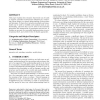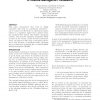17456 search results - page 23 / 3492 » Governing with information technologies |
DGO
2003
13 years 11 months ago
2003
As part of a National Science Foundation-funded study, we analyze data from a 2002 Midwest urban random sample survey (n = 167 adults) of differential access to and uses of comput...
ICEGOV
2007
ACM
14 years 1 months ago
2007
ACM
This paper explains how semantic frameworks can be used to support successful e-Government initiatives by connecting system design to a shared understanding of interactions and pr...
HICSS
2003
IEEE
14 years 3 months ago
2003
IEEE
Healthcare technology investments must be borne by charity, government subsidy, or patient reimbursement. Such investments can be expensive and require partnerships of public and ...
COOPIS
2002
IEEE
14 years 2 months ago
2002
IEEE
This paper demonstrates that work in digital enterprises—like work in conventional enterprises— can be carried out effectively by autonomous agents, subject to a regulatory r...
HICSS
2006
IEEE
14 years 3 months ago
2006
IEEE
Strategic alliances are the primary collaboration form for organizations participating in value webs, the most widely used form of structuring business activities in the digital e...


